
Today’s rejection of the Omnibus package in the European Parliament sends a clear signal: the road toward a truly circular, transparent economy remains uncertain — but the need for leadership is stronger than ever. This does not mean that the Omnibus package is rejected definitively, but it does mean that further simplification and lowering of ambitions are on the table.

The Omnibus package was meant to streamline sustainability regulations, including the Corporate Sustainability Reporting Directive (CSRD) and the Corporate Sustainability Due Diligence Directive (CSDDD). By voting against it, the European Parliament has effectively halted a legislative effort that many saw as a compromise between ambition and simplification. The outcome reflects growing tension between reducing administrative burdens and maintaining environmental accountability.
For circular services providers like us, this decision reshapes the playing field. Our mission has always been to make transparency, traceability, and material reuse the norm — not the exception. When regulation steps back, it’s up to innovators and frontrunners to step forward. And that’s what we have always done: focus on companies that want to take steps towards a more circular economy, regardless of legislation. We firmly believe their pioneering activities will pay off.
A setback in legislation doesn’t mean a setback for circularity. If anything, it underlines the need for businesses to take responsibility beyond compliance. While the Omnibus aimed to simplify corporate reporting, it risked diluting the very data that helps companies understand their material flows, carbon impact, and reuse potential. Without this visibility, the path to circular business models becomes harder to follow — and even harder to prove. And that is not just about communicating with customers. Even though we’re not in favour of introducing ever more legislation, we do believe that sustainability legislation can ensure that the essence of sustainability becomes ingrained in every corner of a company. And that is valuable. Sustainability in the broader sense is about materials, positive impact and quite simply: good, profitable business.
Yet where regulation pauses, opportunity grows. Companies that continue to measure and communicate their circular progress will distinguish themselves in a market increasingly defined by stakeholder expectations. Circularity isn’t just a reporting obligation — it’s a competitive advantage. We will continue to provide the digital infrastructure and expertise that help our clients turn data into action, and ambition into measurable impact.
We also recognise that today’s vote highlights a wider need: alignment between policymakers, businesses, and technology partners to make sustainability practical and scalable. Whether through product passports, lifecycle data sharing, or transparent reporting, we remain committed to building tools that make circular performance both visible and valuable.
The Omnibus debate may have paused one version of progress, but the transition toward a circular economy doesn’t wait for political consensus. It continues with every company choosing to take ownership of its materials, measure what matters, and design for reuse.
At Cirmar, we’ll keep leading that movement — helping organisations go beyond compliance, future-proof their products, and prove the impact of circular choices.